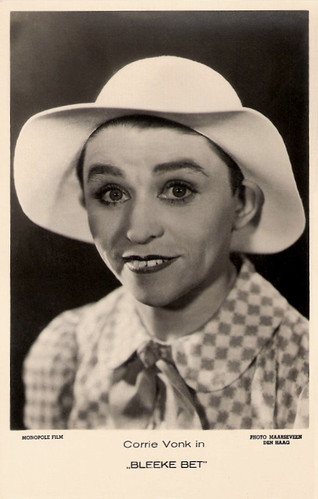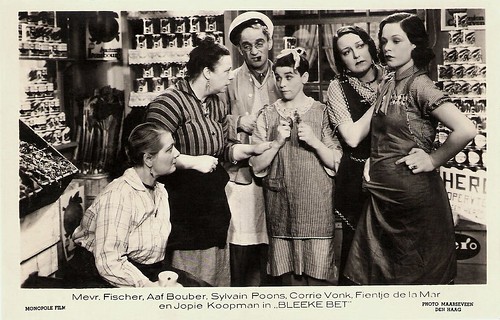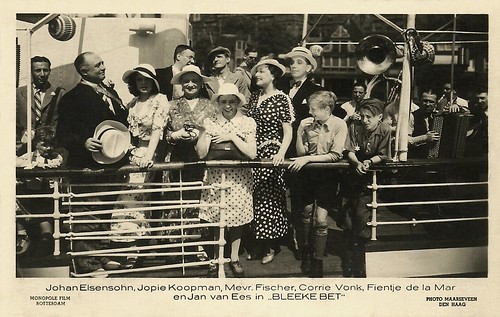At the Unofficial Netherlands Film Star Postcards Festival (NFSPF), today a post on a star of the Dutch cabaret and revue, Corry Vonk (1901-1988). In the 1930s, she also often appeared in some Dutch films.

Dutch postcard by M.B. & Z. (M. Bonnist & Zonen, Amsterdam). Photo: Monopole Film/Dick van Maarseveen, Den Haag. Publicity still for Bleeke Bet (1934).
Cornelia Diederika Vonk was born in Amsterdam, The Netherlands in 1901. Her father was the stage manager of Theater Carré, the most famous theatre in Amsterdam.
At 12, Corry (sometimes written as Corrie) made her stage debut with the theatre company of Nap de la Mar, the father of the legendary Dutch actress Fien de la Mar. Later she worked for the companies of cabaret star Louis Davids and actor/director Eduard Verkade.
In 1933 she married cabaret artist Wim Kan, who was almost ten years younger.
In the 1930s she played some supporting parts in Dutch films, like in Bleeke Bet/Bleak Beth (Alex Benno, Richard Oswald, 1934), De Suikerfreule/The Sugar Countess (Haro van Peski, 1935) with Johan Elsensohn, Kermisgasten/Show People (Jaap Speyer, 1936) with Johan Kaart, and Komedie om geld/The Trouble with Money (Max Ophüls, 1936).
She also co-wrote the scenario for the hit film Pygmalion (Ludwig Berger, 1937) based on the play by George Bernard Shaw. In 1936 Wim Kan started the ABC-cabaret, of which his wife was the big star. Kan wrote some texts for her which became classics of the Dutch cabaret, including the monologue Het konijn is dood (The bunny is dead).

Dutch Postcard by Monopole Film, Rotterdam. Photo: Dick van Maarseveen, Den Haag (The Hague). Publicity still for Bleeke Bet (1934).

Dutch Postcard by Monopole Film, Rotterdam. Photo: Dick van Maarseveen, Den Haag (The Hague). Publicity still for Bleeke Bet (1934).

Dutch Postcard by Monopole Film, Rotterdam. Photo: Dick van Maarseveen, Den Haag (The Hague). Publicity still for Bleeke Bet (1934).
In 1939 Corry Vonk, Wim Kan and the ABC-cabaret left for a tour through the Dutch East Indies. 2279 days later they could finally return. During the Japanese occupation Corry was imprisoned in the concentration camp Tjimahi.
Buttercup2009 commented on Flickr at the first postcard in this post: "The book, The Way of a Boy - a Memoir of Java by Ernest Hillen who was 7 years old at the time of the Japanese invasion of the Dutch East Indies, has some heart warming recollections of Corry Vonk - her selflessness (sharing her food and volunteering for a job no one else wanted - washing bandages at the hospital) and her courage as well as her wisdom. She organized a theatre group in the camp that lifted the spirits of both the participants and the audience. She showed by example how to keep one's goodness in the face of adversity".
After the war, the ABC-cabaret made a come back. Corry Vonk, who had become older, moved to the background. In the following decades Wim Kan became one of the three great stars of the Dutch post-war cabaret.
Corry had some major successes too, such as the 1966 song Met me vlaggetje, me hoedje en me toeter (With me flag, me hat and me horn). And she always appeared on stage at the end of her husband’s legendary one man shows at New Year’s Eve.
In 1982 Corry Vonk was stricken by a brain haemorrhage. One year later Wim Kan died. The last years of her life she passed in seclusion. In 1988 she died in Rheden, the Netherlands at the age of 86.
Trailer of Komedie om geld/The Trouble with Money (1936). Source: Flawless 1212 (YouTube).
Corry Vonk sings Met me vlaggetje, me hoedje en me toeter (With me flag, me hat and me horn). Source: Vanalleswat33 (YouTube).
Sources: Buttercup2009 (Flickr), Wikipedia, and IMDb.

Dutch postcard by M.B. & Z. (M. Bonnist & Zonen, Amsterdam). Photo: Monopole Film/Dick van Maarseveen, Den Haag. Publicity still for Bleeke Bet (1934).
Cabaret
Cornelia Diederika Vonk was born in Amsterdam, The Netherlands in 1901. Her father was the stage manager of Theater Carré, the most famous theatre in Amsterdam.
At 12, Corry (sometimes written as Corrie) made her stage debut with the theatre company of Nap de la Mar, the father of the legendary Dutch actress Fien de la Mar. Later she worked for the companies of cabaret star Louis Davids and actor/director Eduard Verkade.
In 1933 she married cabaret artist Wim Kan, who was almost ten years younger.
In the 1930s she played some supporting parts in Dutch films, like in Bleeke Bet/Bleak Beth (Alex Benno, Richard Oswald, 1934), De Suikerfreule/The Sugar Countess (Haro van Peski, 1935) with Johan Elsensohn, Kermisgasten/Show People (Jaap Speyer, 1936) with Johan Kaart, and Komedie om geld/The Trouble with Money (Max Ophüls, 1936).
She also co-wrote the scenario for the hit film Pygmalion (Ludwig Berger, 1937) based on the play by George Bernard Shaw. In 1936 Wim Kan started the ABC-cabaret, of which his wife was the big star. Kan wrote some texts for her which became classics of the Dutch cabaret, including the monologue Het konijn is dood (The bunny is dead).

Dutch Postcard by Monopole Film, Rotterdam. Photo: Dick van Maarseveen, Den Haag (The Hague). Publicity still for Bleeke Bet (1934).

Dutch Postcard by Monopole Film, Rotterdam. Photo: Dick van Maarseveen, Den Haag (The Hague). Publicity still for Bleeke Bet (1934).

Dutch Postcard by Monopole Film, Rotterdam. Photo: Dick van Maarseveen, Den Haag (The Hague). Publicity still for Bleeke Bet (1934).
Japanese Concentration Camp
In 1939 Corry Vonk, Wim Kan and the ABC-cabaret left for a tour through the Dutch East Indies. 2279 days later they could finally return. During the Japanese occupation Corry was imprisoned in the concentration camp Tjimahi.
Buttercup2009 commented on Flickr at the first postcard in this post: "The book, The Way of a Boy - a Memoir of Java by Ernest Hillen who was 7 years old at the time of the Japanese invasion of the Dutch East Indies, has some heart warming recollections of Corry Vonk - her selflessness (sharing her food and volunteering for a job no one else wanted - washing bandages at the hospital) and her courage as well as her wisdom. She organized a theatre group in the camp that lifted the spirits of both the participants and the audience. She showed by example how to keep one's goodness in the face of adversity".
After the war, the ABC-cabaret made a come back. Corry Vonk, who had become older, moved to the background. In the following decades Wim Kan became one of the three great stars of the Dutch post-war cabaret.
Corry had some major successes too, such as the 1966 song Met me vlaggetje, me hoedje en me toeter (With me flag, me hat and me horn). And she always appeared on stage at the end of her husband’s legendary one man shows at New Year’s Eve.
In 1982 Corry Vonk was stricken by a brain haemorrhage. One year later Wim Kan died. The last years of her life she passed in seclusion. In 1988 she died in Rheden, the Netherlands at the age of 86.
Trailer of Komedie om geld/The Trouble with Money (1936). Source: Flawless 1212 (YouTube).
Corry Vonk sings Met me vlaggetje, me hoedje en me toeter (With me flag, me hat and me horn). Source: Vanalleswat33 (YouTube).
Sources: Buttercup2009 (Flickr), Wikipedia, and IMDb.
No comments:
Post a Comment